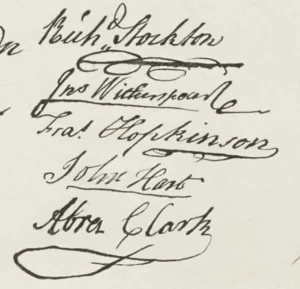Jonathan Witherspoon – 5 from New Jersey
Besides being the only minister among the 56 signers of the Declaration of Independence, Jonathan Witherspoon is unique in that his reputation as an active minister, leader and educated orator preceded him across the Atlantic Ocean.
Witherspoon was born in 1723 and educated at the University of Edinburgh; he was also the author of many moving and inspirational sermons and other texts. It was one of his sermons, “The Trial of Religious Truth by its Moral Influence,” that was well read in the colonies and brought the young minister to the attention of Richard Stockton, a Declaration signer and also a trustee at the College of New Jersey, later known as Princeton. Stockton went to Scotland to meet with Witherspoon and ask him to become president of the University.

Witherspoon accepted and the family moved to Princeton where he improved the curriculum and made Princeton a stronger and better college. The debate societies and programs he started there became the learning grounds for both Aaron Burr and James Madison among others.
As a Scotsman, Witherspoon was not a fan of the English from the onset, so his sermons and local activities led to his essay on the “Thoughts on American Liberty” and his belief in independence for the colonies. He then became active in establishing a new constitution for New Jersey and efforts to oust Royal Governor William Franklin from office. Franklin was the illegitimate and estranged son of Benjamin Franklin and a follower of the Royal government.
Witherspoon is recognized as the fiery minister who stood up during the debates on the independence resolution to chide a fellow delegate that “the country is not only ripe for the measure of independence but in danger of becoming rotten for the want of it.”
After the adoption, Witherspoon’s remained in Congress for six more years, serving on boards and committees including one dealing with collecting foreign intelligence through letters from friends overseas. He also served in the state legislature and was in the convention that ratified the national Constitution in 1789.
The minister’s son, James, was killed at the Battle of Germantown. His home and offices were ransacked by the British causing the loss through damage or fire of untold numbers of essays and other works dating back to his time in Europe.
Witherspoon was at the lead of those reorganizing the Presbyterian Church at the national level and served as moderator of the first assembly of the group in 1879.
Witherspoon’s wife died in 1779, and two years later he married a 24-year-old widow and the couple had two children before his death in 1794 at the age of 71. He is buried in the President’s Lot at Princeton Cemetery.